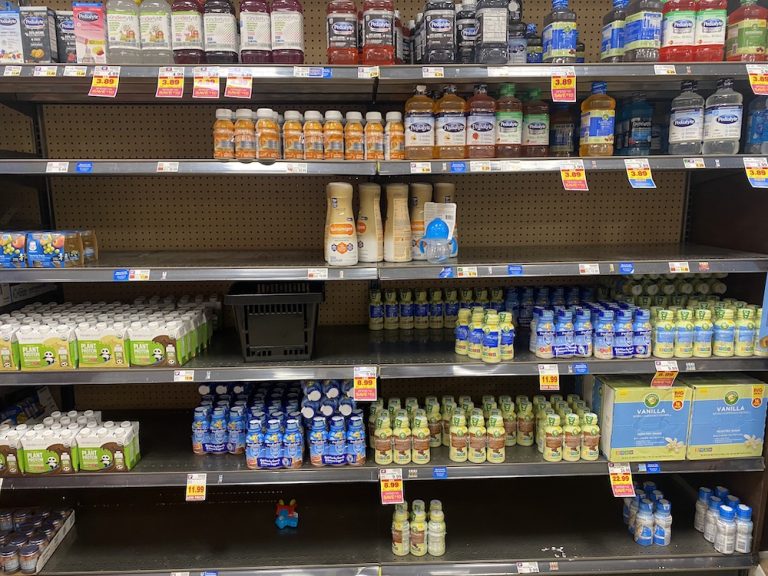The “baby-formula crisis” of 2021-22 sent U.S. parents of young kids into a panic, but it also provided a textbook example for business journalists of the dangers of oligopolies and fragile supply chains.
While Mexico, Ireland and the Netherlands have enjoyed being primary importers of baby formula into the United States for years, together they supply only 2% of the country’s needs. The remaining 98% has been produced domestically – until May.
That’s when the U.S. Food & Drug Administration loosened up on what’s been called overly complex, stringent and/or inflexible regulations on baby-formula imports. It was a necessary move considering the dire situation.
A perfect storm, involving baby formula, began churning in the United States from late 2021 to well into early 2022. It’s possible that an issue at one manufacturer’s plant wouldn’t deserve much attention from business journalists. But when that plant produces nearly half of such an essential product in the U.S., experts and critics argue that the company has a near vise-like grip over its consumers.
Problems at Abbott
“Abbott controls 40% of the market,” said Hitendra Chaturvedi, Arizona State University business professor and expert on supply chain management. “It was literally an oligopoly. The issue here is we didn’t have a mitigation plan compounded by very strict control of imports.”
The first hint of a problem at Abbott’s Sturgis, Michigan, plant – which produces more than a million pounds of powdered infant formula every month – came in September 2021. The FDA held a “routine surveillance inspection” after reports of infections that appeared to be linked to Abbott formula, according to The Hill. In October, a former Abbott employee sent the FDA a 34-page report outlining Abbott’s “unsanitary conditions,” The Hill reported. Top FDA officials said they didn’t see the report and didn’t request an interview with the former employee until December.
The FDA didn’t follow up on that inspection until January 2022. Then, in early February, the FDA collected samples that confirmed the existence of Cronobacter sakazakii – which can be deadly in newborns. On Feb. 17, the FDA announced that it was investigating reports of four sick babies in three states. The same day, Abbott Nutrition issued a voluntary recall of its powder formula.
Former employee’s report
The public didn’t see the details of the former employee’s report until after it was submitted to Connecticut Congresswoman Rosa DeLauro. DeLauro shared the report on her website in April. Then DeLauro, chair of the House Appropriations Committee, issued a statement.
“Let me be clear from the start: we are not going to get to the bottom of what went wrong if everyone involved wants to skirt accountability,” DeLauro said in a news release. “The FDA dragged its feet in responding to a whistleblower report alleging food safety issues at the Abbott Nutrition plant in Sturgis, MI, and now, they’re blaming COVID-19 mailroom issues as the reason that senior FDA officials and then-Acting Commissioner Janet Woodcock did not swiftly respond to these claims. This excuse is convenient but not compelling enough.”
The 34-page report submitted by the former Abbott employee alleges the company committed six major violations: falsification of records involving testing of sealed merchandise; releasing untested baby formula; hiding details from a 2019 FDA audit; poor practices with clean-in-place procedures; failure to correct defects as mandated by Good Manufacturing Practices; lack of traceability of the product and an environment of retaliation against anyone who raised concerns about company practices.
Abbott responded to the 34-page report on the company website, saying that the former employee was dismissed “due to serious violations of Abbott’s food safety policies.”
“Abbott takes employee concerns very seriously and we foster a culture of compliance to produce the best and highest-quality formula,” the statement said. “We empower our employees to identify and report any issues that could compromise our product safety or quality, which comes before any other considerations.”
Concerned parents
Once the recall started, shelves that once housed baby formula were largely empty. On the rare occasions limited supplies of formula were stocked, parents had to be creative to get enough. This newfound creativity offered journalists the opportunity to share how parents coped with the shortage.
“The baby formula shortage is frightening as hell. Lucky parents are able to travel town to town to procure food for their infants,” Lindsey Simmons, a Missouri parent who ran for Congress in 2020, said on Twitter. “Many, many others are facing a crisis unsure of how to get the right formula that fits their baby’s allergy needs.”
With the walk into parenthood already being a monumental life adjustment, new parents began to lean on family, friends and fellow moms. The problem was especially acute for parents dependent on sourcing formula through the government’s WIC program, which provides financial assistance for needy families to purchase formula but limits the types of formula on offer.
Elenee Dao, a reporter with KXLY 4 News in Spokane, Washington shared what one parent did in May.
“One Spokane mom drove more than six hours to buy and stock up on a certain kind of formula, not able to find it in the region and needs to buy it under WIC,” Dao wrote on Twitter with a photo of formula stockpiled in a closet.









